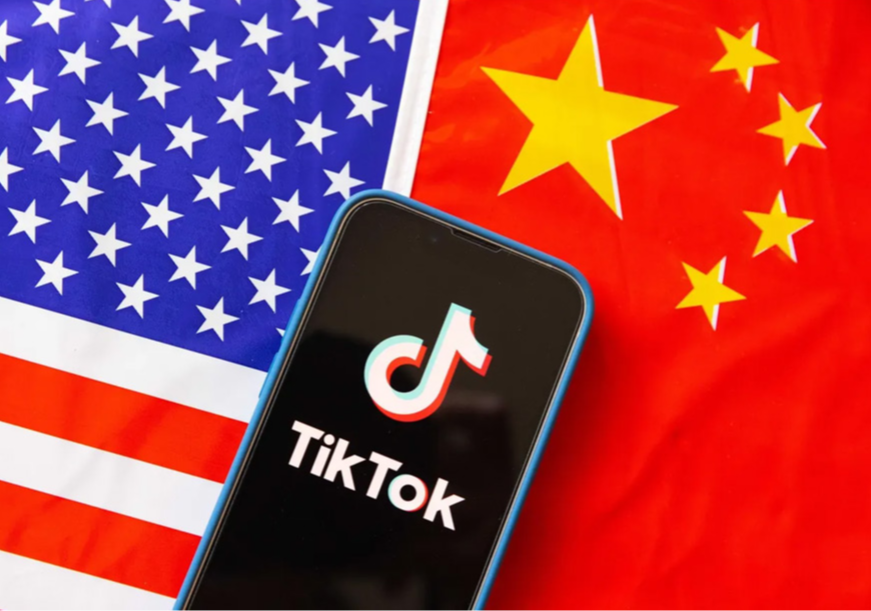-
CENTRES
Progammes & Centres
Location
The TikTok issue between the US and China is not a battle of values but part of a bigger war for geopolitical, geoeconomic, and geotechnological dominance

Chinese-origin short-form video platform TikTok is back making international headlines. In March, the United States (US) House of Representatives approved the “Protecting Americans from Foreign Adversary Controlled Applications” bill with an overwhelming bipartisan majority, essentially calling for a ban on the platform in the US. However, the bill exempted any such application that divests its US operations to a non-adversarial entity within six months, thereby offering the platform’s owners an alternative.
After Congressional negotiations, the bill was passed again in the House in April, with the time frame for divestiture updated from 6 months to 9 months (extendable to 12 months on the basis of progress shown). Shortly after, for the first time in history, the US Senate went ahead and approved such a bill—one that is focused on a single company—in an expedited process, with President Joe Biden signing it into a law immediately.
In a crucial election year, this rare show of Congressional unity between the Democrats and Republican lawmakers comes at a time of hyper-polarisation in the US polity. The key driver seems to be the growing security risks from TikTok’s ever-increasing role as a leading source of information in the US.
Recently, Christopher Wray, the FBI Director, warned about TikTok (ByteDance) being controlled by the Chinese government. This allows Beijing-controlled institutions to influence American people as the same platform can be used for launching “espionage operations”. Further, the annual Threat Assessment Report from the US’s Director of National Intelligence recently highlighted the continued interference of the Chinese government and the risks of engaging with platforms like TikTok in their current form.
What has ignited the attention of American lawmakers is TikTok’s close association with the Chinese Communist Party (CCP), reportedly through the infamous United Front Work Department (UFWD.) Since its establishment in 1949, the “United Front” has been actively involved in the realms of media, academia, culture, thought, and narratives as a front organisation for the CCP’s foreign policy and influence operations abroad. A report submitted to the Australian Parliament in 2023 reveals that a number of senior executives at its parent company ByteDance have been known to be United Front members.
Further, from 2017, one piece of legislation in China has come to be of particular concern to foreign governments and companies—the National Intelligence Law. Article 7 of this law states that “any organization or citizen shall support, assist and cooperate with the state intelligence work in accordance with the law,” adding that the state “protects” any individual and organisation that aids it.
The annual Threat Assessment Report from the US’s Director of National Intelligence recently highlighted the continued interference of the Chinese government and the risks of engaging with platforms like TikTok in their current form.
In the context of the US ban, the main issues being flagged now are not just that of the Chinese government having access to US citizen data (exploitation of user data has been a long-known peril of the Internet age), but also the censoring of narratives that are unfavourable to China—for example, information on Hong Kong, Xinjiang, Tibet, economy, governance, etc.—and the spreading of propaganda by planting/influencing narratives that are favourable to China.
Notwithstanding the current actions by the US establishment, TikTok has been controversial. Given its security threats, India (despite 200 million users on the platform at the time) banned it in June 2020. Over the last five years, more than 50 countries including France, the United Kingdom, Australia, and several members of the European Union (EU) have imposed a ban on TikTok.
Unlike India, which was in the midst of a direct military conflict with China on its border in June 2020, the US is not in an ‘active state of conflict’ with China yet. Why this ban then? President Bill Clinton's famous China Trade Bill Speech while welcoming China to the WTO had pushed for a US-China bonhomie: “For the first time, our companies will be able to sell and distribute products in China made by workers here in America without being forced to relocate manufacturing to China, sell through the Chinese government, or transfer valuable technology — for the first time. We'll be able to export products without exporting jobs.” The contrary to this progressive (for its time) American vision of integrating China into the global system as a partner has happened. The US and China have ended up getting locked in a battle for supremacy and one-upmanship that has, over a period of time, changed from being geopolitical, to geoeconomic and then geotechnological. A lot of this has to do with China’s astonishing global economic and geopolitical rise, which is now challenging US hegemony.
The US and China have ended up getting locked in a battle for supremacy and one-upmanship that has, over a period of time, changed from being geopolitical, to geoeconomic and then geotechnological.
In geotechnology terms, China opened a flashpoint as early as 2010 when it banned American powerhouse Google’s search engine services from its territory. After seeing popular global internet platforms like Facebook, Amazon, Twitter, Wikipedia, and the New York Times get banned in China, the US finally came to react forcefully during the Trump presidency, imposing restrictions on Chinese technology giants starting with telecom behemoth Huawei in 2019. The current “TikTok War” between these two great powers takes this battle to another level.
Many analysts have billed the TikTok saga as a battle between the US’s democratic values and China’s autocratic interests. An equal number of analysts think the ban is against free speech and is likely to strengthen authoritarian censorship abroad. However, the US-China TikTok battle is not one of values. As mentioned earlier, it is part of a bigger war for geopolitical, geoeconomic, and geotechnological dominance.
From a pure technology and economics perspective, TikTok’s biggest strength is its core recommendation engine, based on its advanced AI algorithm trained over years and vast amounts of data. Will Beijing allow its most popular international digital asset’s core IP to be sold to its biggest geotechnological adversary? The US$ 100+ billion valuation for its US business might seem like an enticing cash-out, but protecting the wildly successful technology core might be worth much more.
Will TikTok (and thus Beijing,) simply accept getting banned in the US? China’s much-discussed ‘Three Warfares Strategy (TWS)’ suggests that a third option might be invoked soon—to legally contest the divest-or-ban mandate having unexpectedly seen it go through as Legislation, while continuing to lobby strongly in favour of the platform.
If the issue does end up in court, the American judiciary would have to consider a significant base of 170 million active users—creating 224,000 jobs, 7 million businesses, and US$ 24.2 billion in GDP as per a recent Oxford Economics study.
President Biden, officially supportive of the bipartisan decision in the US Congress to ban the platform if it doesn’t divest, has made considerable efforts to reach out to a new youthful audience in his 2024 re-election campaign—on TikTok.
Further, TikTok’s fate hinges on the ensuing flip-flops in the US political sphere on the matter and expects a reversal in the Executive stance if a new US President takes over in early 2025. Donald Trump, who was pushing for a ban on the platform in 2020, has since reversed his stance, having been banned from Facebook. President Biden, officially supportive of the bipartisan decision in the US Congress to ban the platform if it doesn’t divest, has made considerable efforts to reach out to a new youthful audience in his 2024 re-election campaign—on TikTok.
Looking ahead, the technical, even legal, case favouring a ban on TikTok across the world’s otherwise liberal democracies remains a shifting goalpost. The economic one—the blowback from antagonising “the world’s factory”—remains a real consideration. But with ever-growing reports on China’s expanding cyber-warfare against them—the latest being the confirming of the UK Electoral Commission hack from 2021 and warnings of interference in the 2024 US elections—the political one increasingly looks like a foregone conclusion.
Rahul Batra is a geopolitical analyst with extensive experience at the intersection of digital platforms and international affairs.
The views expressed above belong to the author(s). ORF research and analyses now available on Telegram! Click here to access our curated content — blogs, longforms and interviews.

Rahul Batra is an independent consultant with extensive experience at the intersection of digital platforms and international affairs. He spent many years across Google’s global ...
Read More +